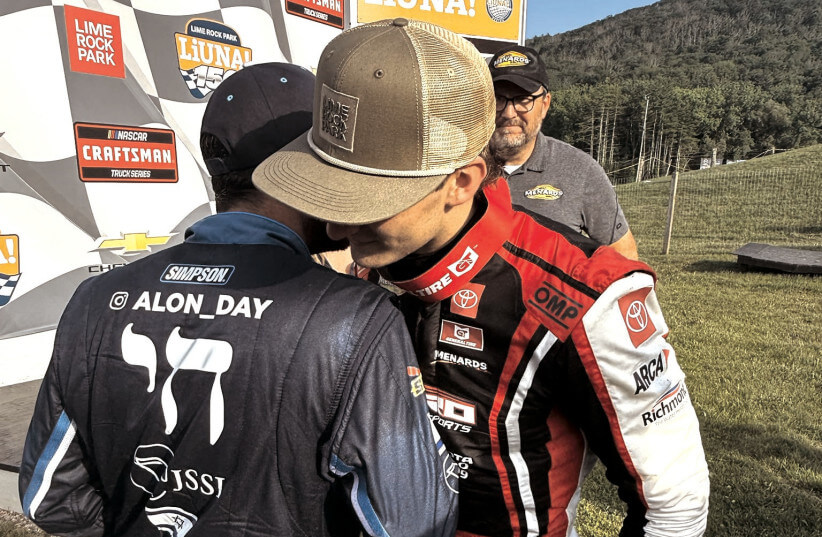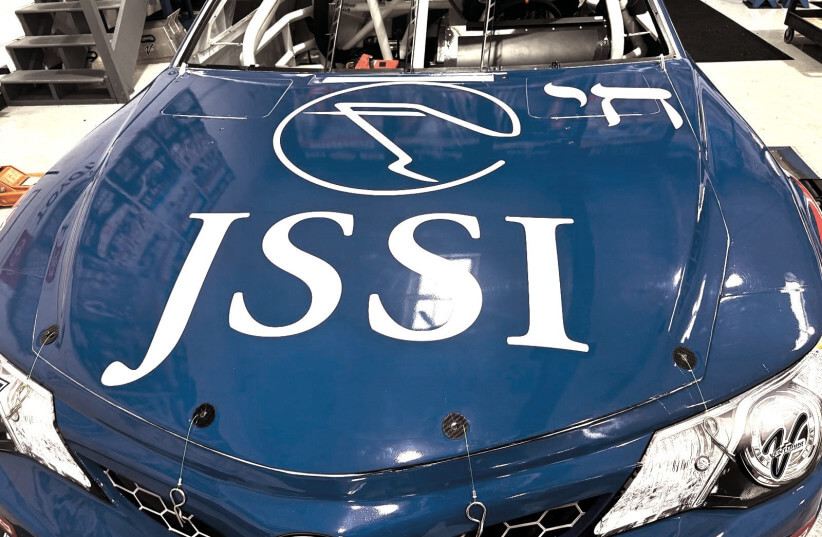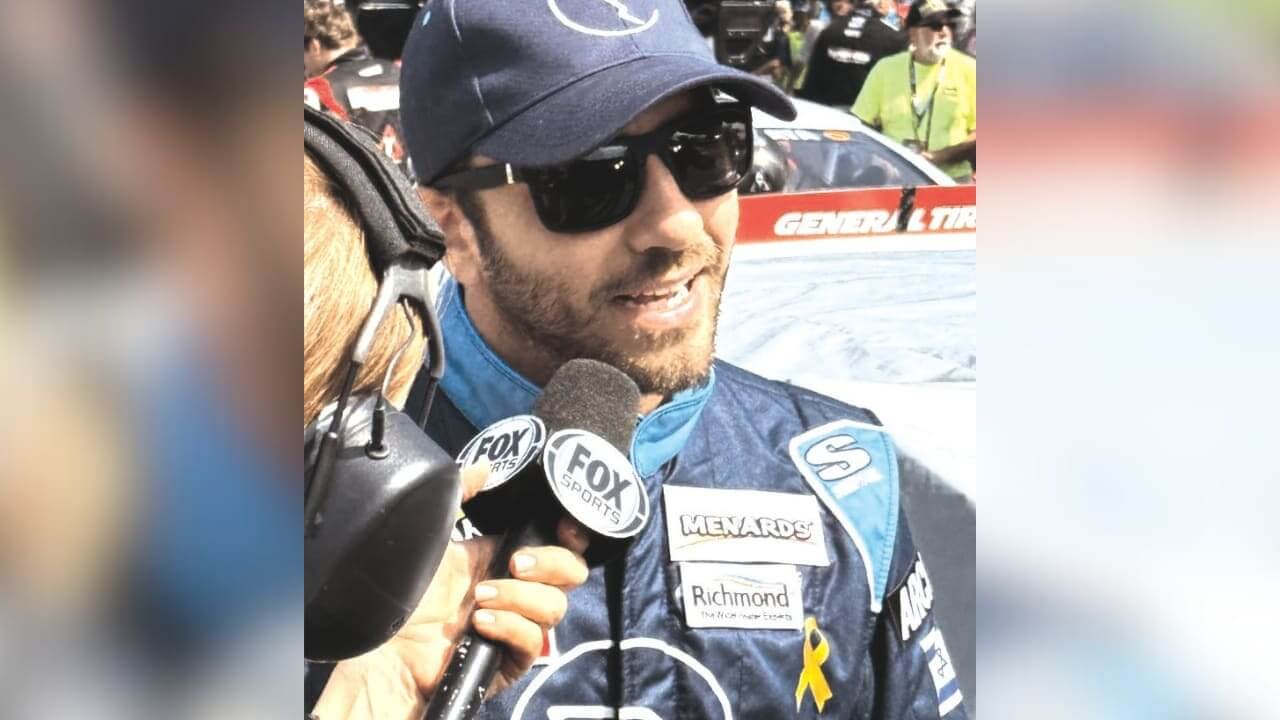Sporting a “chai” on his car and a yellow ribbon on his suit, Israeli NASCAR driver is more than a racer – he’s a symbol of resilience, remembrance, and pride.
View original article in the Jerusalem Post
Israel’s only professional NASCAR driver, Alon Day, is currently competing in the prestigious ARCA Menards Series circuit this summer in the United States, where he proudly, bravely, and openly represents the Holy Land.
The four-time NASCAR Euro Series champion drives a blue and white Toyota Camry with the Hebrew word “chai” printed on the hood – next to the initials “JSSI,” the name of his proud and equally pro-Israel sponsor, Jet Support Services, Inc.
Day, 34, sports the same “chai” in large Hebrew letters on the back of his jacket and a yellow ribbon to remember the hostages, many of whom he knows personally from the peaceful year he spent in 2017 living in Kfar Aza.
In a Zoom interview with The Jerusalem Post from his team’s base camp in Salisbury, North Carolina, Day was wearing a necklace with a map of Israel pendant. Day shared the story of his incredible determination to get to the United States with Israeli airspace closed to flights as Iranian ballistic missiles fell on Israel, his incredible second-place finish in his race this past Saturday, and the story of how a boy from Ashdod became a professional racecar driver.
Day’s journey, from his bomb shelter in Ashdod, where he and his pregnant wife sought shelter from Iranian ballistic missiles the recent two weeks, to the three road races for Team Venturini Motorsports – at Lime Rock Park in Connecticut (June 28), Sonoma Raceway in California (July 11), and Watkins Glen, NY (August 9) – was long, challenging, and remarkable.

“I won’t let a few ballistic missiles from Iran get in the way,” joked Day, who took matters into his own hands in an effort to get to the United States. Flying was off the table – even his sponsor, Neil Book, CEO of JSSI, a leader in the business aviation industry, could not arrange a flight from Israel in the middle of a war.
“I tested many options,” recounted Day, who considered escape routes through Amman, Jordan, and Sharm el-Sheikh, Egypt. He even booked himself on a boat to Cairo, where he would have then flown to New York. The racer ultimately decided to take a 40-passenger boat, no more than 30 to 40 feet in length, for 30 hours, to Cyprus. His wife accompanied him to the port in Ashdod and gave her blessing for him to board and get to the US.
“Go – don’t think about it,” she offered. “It was a hell of a journey. It was really, really tough!”
Day has enjoyed years of competing extensively and successfully in Asian and European events. He won the Asian Formula Renault Challenge at 17 years old in 2009 and has 32 wins in 95 starts since his debut with the NASCAR Whelen Euro Series in 2015. Day earned NASCAR Whelen Euro Series championships in 2017, 2018, and 2020.
Day feels that racing in America is a “once in a lifetime opportunity to show what I am capable of.”
He playfully compares racing in Europe to playing basketball in the Euroleague.
“But racing in America is like playing in the NBA!”
After arriving in Cyprus, Day flew to Greece, then on to New York and North Carolina to be with his team, and pass his physical and driving tests. He arrived in Connecticut in time for his June 28 race, which proved to be quite eventful.

Day shared his June 28 race experience in a Facebook post: “What a rollercoaster of a race! Started 4th, climbed to 1st, dropped to last due to a penalty, fought back to finish 2nd. It’s tough to accept losing the win like that, but I’m already looking ahead to the next race: Sonoma 7/11.”
The race, which lasted just over an hour and included one stop for fuel and one tire change, started off well and without incident. Day moved from fourth to first place in the first few laps. After 34 laps, due to a communication failure, Day missed an important directive – that drivers were required to enter the pits as part of the planned break. Day failed to exit and was assessed a heavy penalty. He started the second part of the race in last place.
After a heroic battle that lasted 32 laps, Day managed to climb to second place. At the end of the race, he raised his trophy and exclaimed: “It was a sweet and bitter ending for me. It’s frustrating to think that I led the race by a large margin of four seconds and lost it because of a communication problem. Despite everything, JSSI’s Toyota Camry was so fast that I managed to overtake everyone, coming from last place to second place. My mind is already on the next race.”
“I’m so proud of the race Alon ran today,” said Book, the CEO of JSSI. “A strong second-place finish, which doesn’t come close to telling the real story. His journey to be here, the heart he showed on the track, fighting to the top of the leaderboard after an unfortunate setback. He’s a true champion, as the rest of the world is now discovering. Excited for the next race. Am Yisrael Chai!”
American Jews are not typically fans or financial backers of auto racing. Book, who was with Day in Connecticut, is taken by Day’s “perseverance, his resilience. Who better is there to represent Israel than Alon?” he asked.
Day and Book are both unapologetic supporters and defenders of Israel. Last year, the Chicago businessman took out an ad in the Chicago Tribune calling out the mayor and city council for their stances on Israel. “Chicago has major crime and gun violence, and the mayor calls for a ceasefire in Gaza?!” asked Book.
Book has been a believer in and supporter of Day since they were connected by mutual friends last year.
“When a friend reaches out to tell you about an Israeli NASCAR driver, you think they are joking!” said Book. He then described how he was wowed by Day after their initial 30-minute Zoom meeting.
“This is a guy who has been so personally affected by October 7th. He has friends who were slaughtered, taken hostage, and not accounted for. I saw his determination. I was hooked right away.”
The two spent time in Chicago last summer at events surrounding a road race there.
“I saw a champion out there.”
He offered his financial backing.
“For this season, I said let’s do it the right way – with the right people, the right team, the right car.”
Book also wanted to make sure Day’s racecar had “visibility and clarity.” Their initial proposal to NASCAR to feature a car with a Star of David was not accepted, but the “chai” logo was permitted.
Book also feels that racing in America offers expanded opportunities for getting the message out about Israel.
“The bigger his platform, the more he will talk about what is happening in Israel.”
Day is so appreciative their visions align – and for the financial support Book provides.
“This sport is all about sponsorship and money, which is important to help win races,” Day remarked.
“We are honored to partner with Alon Day for a second year,” added Book. “Alon represents the heart and spirit of the Israeli people: commitment to excellence, tremendous work ethic, and ability to persevere in the face of enormous adversity. These are the traits that we strive to embody at JSSI.”
Long journey to NASCAR
Day’s long journey to NASCAR actually started when he was a child growing up in Ashdod. He was very interested in car and airplane simulators. For a bar mitzvah present, his father purchased an expensive go-kart. Day mastered the vehicle and became an accomplished go-kart racer in Israel and Europe.
He seriously considered becoming a fighter pilot in the Israeli Air Force and passed all the necessary tests. He then had an important decision to make: pursue his ambition to become a professional racecar driver, or continue with the pilots’ training course.
Day opted to pursue car racing, but felt strongly about completing compulsory military service. He found what he describes as “the perfect balance” – working for three years in F-16 intelligence as part of the F-16 squadron. Due to his special sportsman’s status with the IDF, he was also given adequate time to train and compete.
After completing military service, Day’s racing career began to take off. After winning his first European championship, he moved to Kfar Aza for a year (2017-2018).
“I looked for a quiet place. I am not a city guy. It was a perfect match. A good environment, good people.”
Day liked Kfar Aza so much that he considered returning there permanently to live. His wife-to-be preferred not to live on a kibbutz, and the two instead live in Gan Yavne. Sadly, many close friends from Kfar Aza were killed or taken hostage on October 7, 2023 – and Day is painfully aware of what might have been his fate had he remained there.
Day strives to “bring the message about the hostages through racing.”
He also uses his platform on the international stage to help fight rising antisemitism. He feels he can’t hide his being Jewish and Israeli.
“It is who I am. Israel is my home country. I am on a mission.”
Day has been pleased with the support he has received from many in the Jewish and Christian communities.
“I get tons of messages on social media – people in the Jewish community are starting to watch NASCAR – people are coming out. My biggest surprise has been that a lot of Christians, especially in the NASCAR community, are patriots and pro-Israel and support Israel.”
At the same time, Day has encountered anti-Israel protests. In Chicago last year, anti-Israel protesters jumped over a barrier to the racetrack. And during Saturday’s race, his phone was reportedly targeted; he was receiving messages in Arabic.
Day remains steadfast in his public support of Israel and regularly shares his message on the racing circuit. But for now, Day is focused on his most immediate goal – winning his next race.
